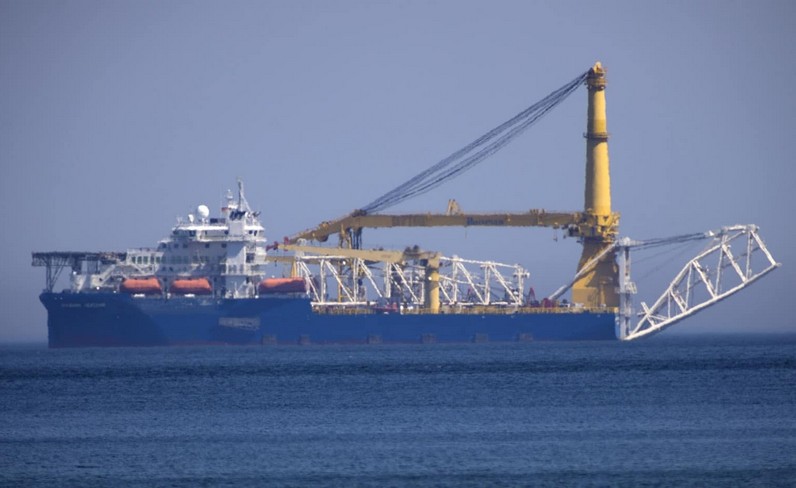Kategori : NATURAL GAS ENERGY NEWS, ENERGY AGENDA NEWS - Tarih : 17 July 2020
Nord Stream 2, the company building a gas pipeline between Russia and Germany, has reportedly requested a permit allowing it to use pipe-laying vessels with anchors to complete the final roughly 120-kilometre stretch of pipeline in Danish waters.
Nord Stream 2 has, as a precautionary measure, submitted an amendment request in accordance with the guidance received from the Danish Energy Agency (DEA), Nord Stream 2 EU representative Sebastian Sass told New Europe on June 19, adding that Nord Stream 2 will implement the project in accordance with the construction permit and as assessed in the Environmental Impact Assessment. “The amendment relates to the potential use of pipelay vessels that use anchors for positioning and it only relates to the clarification of one permit condition. This technique was  successfully used during the installation of the already operational Nord Stream pipelines in Danish waters, and for the Nord Stream 2 pipelines already installed in German waters,” Sass said.
successfully used during the installation of the already operational Nord Stream pipelines in Danish waters, and for the Nord Stream 2 pipelines already installed in German waters,” Sass said.
Katja Yafimava, a senior research fellow at the Oxford Institute for Energy Studies, told New Europe on June 19, explained that Nord Stream 2 has requested an amendment/clarification of the existing permit, which was granted in October 2019, so it is not a new permit. “While the existing permit says it is ‘assumed that laying will be carried out using a lay vessel equipped with dynamic positioning’, it also says that laying will be carried out ‘from a lay vessel with dynamic positioning (DP vessel) or an anchored vessel’. Thus, the permit appears to provide for a possibility of using a vessel without DP capability should DEA and Nord Stream-2 agree,” Yafimava said
The Oxford expert noted that the Nord Stream 2 request for an amendment seeks to confirm and codify such agreement as part of the amended permit. She opined that this is being done to allow Nord Stream 2 more freedom of choice in respect of technical characteristics and configurations of vessels it can use for finalising construction, given that the draft US sanctions legislation, the Protecting Europe’s Energy Security Clarification Act (PEESCA), is very broad and retroactive, and as such makes it impossible to know in advance what exactly could/would be sanctioned.
Russian gas monopoly Gazprom has made a request with the Danish government to deploy new vessels in the Baltic Sea for work on Nord Stream 2, Denmark’s environmental protection agency said. “I think this is being done to increase Nord Stream 2’s space for manoeuvre in respect of deciding how to finalise the construction of the remaining section, given the broadness and the retroactivity of the draft PEESCA, so that Russia could finalise construction of the pipeline without undue delays and without significant additional cost,” Yafimava said.
Meanwhile, German government said on June 14 it had “noted with regret” US plans to expand sanctions on Nord Stream 2, deepening a between Washington and Berlin. “I think the US sanctions legislative activity in respect of Nord Stream 2 has already caused a rift not only between Germany and US but also between the EU and US. In my view, the problem is much bigger than just the treatment of Nord Stream 2, the problem is that the US has demonstrated that it is willing to use sanctions as an instrument of foreign and trade policy vis-à-vis its allies and not only vis-à-vis countries it considers adversaries; notably, the draft PEESCA has not mention of ‘coordination with allies’ as for example CAATSA does,” Yafimava referring to Countering America’s Adversaries Through Sanctions Act.
“Also, extraterritorial sanctions are in conflict with international law, which is in the EU interest to protect. I think should draft PEESCA and/or any further US sanctions legislation be adopted, it is likely to catalyze a meaningful response from Europe to protect its companies on this and any other future occasions, thus contributing towards a decline of the global power of the US dollar. Thus, ultimately its ‘Carthago delenda est’ (“Carthage must be destroyed”) attitude towards Nord Stream 2 might cost US dearly,” she argued.
US sanctions reportedly could target everyone who’s still involved in Nord Stream 2, including all companies and persons contributing to equipping the pipe-laying ships, as well as IT service firms, insurance companies and certifiers. Yafimava said the draft PEESCA is very broad and clearly aims at making the finalisation of Nord Stream 2 construction as difficult as possible and as much delayed as possible by all means available, and without distinguishing between European from US allies-countries and non-European companies, until and unless it faces a meaningful response from Europe.





